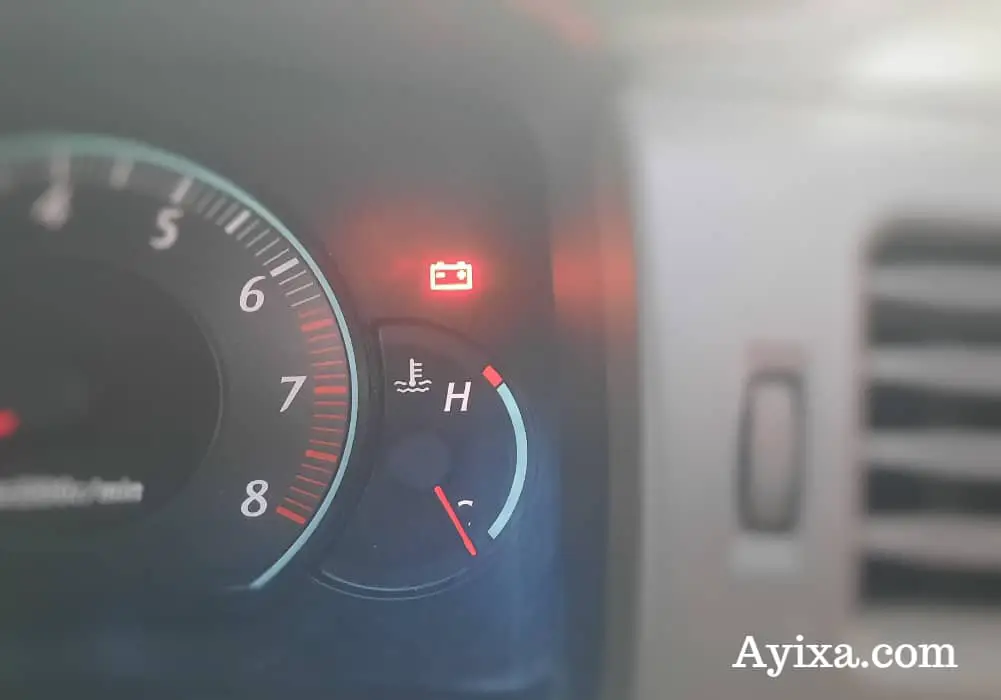Puzzled at why the battery warning light keeps coming on and off as you drive?
Wondering whether you should still drive the car?
Then read on for tips and suggestions that may help you not only understand why the light flickers as you drive but also fix the underlying cause.
Flashing Battery Light while Driving – What it Means
This is probably a sign that the fault detected in the car’s charging system is intermittent in nature.
It may be that there’s a loosely connected battery positive, negative, ground wire connection that sometimes makes a good connection only to momentarily lose it.
Look for loose wire connections connecting from the battery and or alternator.
What Causes the Battery Light to Come on and off while Driving and What to Do?
If the battery warning light keeps coming on and off while driving
1. A good place to start is to check the wire connections running from the battery and alternator for firmness or damage.
A loosely connected wire can momentarily lose its connection when you hit a bump only to regain it later.
Make sure that the car battery terminals firmly hold the battery posts and do not easily move from side to side with a little pressure from your hand!
Also, check that there’s no corrosion around the car battery terminals. Remove any corrosion that there might be.
Is the connector plug connected to the back of the alternator firm?
Unplug it (when the car engine is off) and then firmly reconnect it.
2. Is the alternator and car battery properly grounded? A loose ground connection too can lead to the flashing of the battery warning light as you drive.
What you need: Good quality multimeter, set to read DC volts.
How to test the Negative ground circuit for voltage drops
- Start the car engine. Place the black probe of the multimeter on a known ground connection for the car such as a stud on the car’s metal chassis.
- Next, connect the red meter probe to the battery post’s negative terminal. The voltage reading should not exceed 0.2V. If higher, confirm that the connections are clean and firm connections.
- While keeping the black probe of the multimeter connected to the chassis, next, connect the red meter probe to the car’s engine block. The voltage reading should not exceed 0.2V. If higher, confirm that the connections are clean and firm connections.
If the voltage drop is higher than 0.2V with either the car chassis or engine block even after confirming the cable connections, then there is probably a broken or damaged cable connection that you need to identify and replace for a good ground connection.
3. Observe if the light flashes only when you switch on a particular accessory. Have you recently added an after-market accessory, perhaps a car amplifier with a high power draw?
It is possible for such a car accessory to momentary “starve” the rest of the car’s electrical system when switched on leading to the light coming on and off.
Check if this might be the case.
4. You may need to have the car alternator tested (on load) at a reputable garage. In some cases, an alternator about to fail may also cause the battery warning light to flicker as you drive.
You may have to add a second battery to fix this. Consult a qualified car professional though.
Is It Safe to Drive?
While you may still be able to drive your car without any problems, it is risky to do so though.
The battery warning light coming on points to a problem with the car’s electrical system.
It could be related to the alternator, battery, or just a loose wire connection.
Regardless, the car engine may stall if the underlying problem is not addressed and you end up needing to tow the car which you could have avoided by fixing the fault in time.
Contact a qualified car mechanic. You can also review the possible causes listed here for clues. You may even be able to fix it yourself!
Related Posts
The Normal Operation of the Car Battery Light and Other Dashboard Lights
Here it is:
- When you turn the ignition key to the start position, the battery light and a few other dashboard lights ( engine check, oil light) momentarily come on as the engine starts then go off.
- When the ignition key is in the ACC position, all the dashboard lights including the battery light warning light should be off.
- With the ignition key in the ON position, all lights on the dashboard light continuously.
The battery light should not light at all as you drive the car. Should it light whether steady, for a few minutes, or intermittently on and off, this signals a problem with your car’s charging system.
Closing Thoughts
If the car battery warning light flashes on and off as you drive then there’s likely a problem with the car’s charging system.
It could be a wiring problem or a connection problem to the alternator, or battery, or possibly that there’s an accessory with a high current draw that’s been switched on.
Do not hesitate to contact a qualified auto mechanic.
Related Posts

